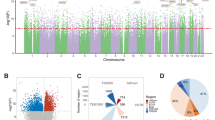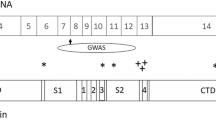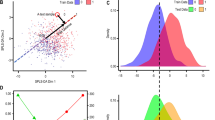Abstract
Many gene variants are involved in the susceptibility to schizophrenia and some of them are expected to be associated with other human characters. Recently reported meta-analysis of genetic associations revealed nucleotide variants in synaptic vesicular transport/Golgi apparatus genes with schizophrenia. In this study, we selected the dymeclin gene (DYM) as a candidate gene for schizophrenia. The DYM gene encodes dymeclin that has been identified to be associated with the Golgi apparatus and with transitional vesicles of the reticulum–Golgi interface. A three-step case–control study of total of 2105 Japanese cases of schizophrenia and 2087 Japanese control subjects was carried out for tag single-nucleotide polymorphisms (SNPs) in the DYM gene and an association between an SNP, rs833497, and schizophrenia was identified (allelic P=2 × 10−5, in the total sample). DYM is the causal gene for Dyggve–Melchior–Clausen syndrome and this study shows the second neuropsychiatric disorder in which the DYM gene is involved. The present data support the involvement of Golgi function and vesicular transport in the presynapse in schizophrenia.
Similar content being viewed by others
Log in or create a free account to read this content
Gain free access to this article, as well as selected content from this journal and more on nature.com
or
References
Purcell, S. M., Wray, N. R., Stone, J. L., Visscher, P. M., O'Donovan, M. C., Sullivan, P. F. et al. Common polygenic variation contributes to risk of schizophrenia and bipolar disorder. Nature 460, 748–752 (2009).
Owen, M. J., Williams, N. M. & O'Donovan, M. C. The molecular genetics of schizophrenia: new findings promise new insights. Mol. Psychiatry 9, 14–27 (2004).
Mudge, J., Miller, N. A., Khrebtukova, I., Lindquist, I. E., May, G. D., Huntley, J. J. et al. Genomic convergence analysis of schizophrenia: mRNA sequencing reveals altered synaptic vesicular transport in post-mortem cerebellum. PLoS One 3, e3625 (2008).
Allen, N. C., Bagade, S., McQueen, M. B., Ioannidis, J. P., Kavvoura, F. K., Khoury, M. J. et al. Systematic meta-analyses and field synopsis of genetic association studies in schizophrenia: the SzGene database. Nat. Genet. 40, 827–834 (2008).
Pappas, G. D., Kriho, V. & Pesold, C. Reelin in the extracellular matrix and dendritic spines of the cortex and hippocampus: a comparison between wild type and heterozygous reeler mice by immunoelectron microscopy. J. Neurocytol. 30, 413–425 (2001).
Shifman, S., Johannesson, M., Bronstein, M., Chen, S. X., Collier, D. A., Craddock, N. J. et al. Genome-wide association identifies a common variant in the reelin gene that increases the risk of schizophrenia only in women. PLoS Genet. 4, e28 (2008).
Chen, M. L., Chen, S. Y., Huang, C. H. & Chen, C. H. Identification of a single nucleotide polymorphism at the 5′ promoter region of human reelin gene and association study with schizophrenia. Mol. Psychiatry 7, 447–448 (2002).
Dimitrov, A., Paupe, V., Gueudry, C., Sibarita, J. B., Raposo, G., Vielemeyer, O. et al. The gene responsible for Dyggve-Melchior-Clausen syndrome encodes a novel peripheral membrane protein dynamically associated with the Golgi apparatus. Hum. Mol. Genet. 18, 440–453 (2009).
Osipovich, A. B., Jennings, J. L., Lin, Q., Link, A. J. & Ruley, H. E. Dyggve-Melchior-Clausen syndrome: chondrodysplasia resulting from defects in intracellular vesicle traffic. Proc. Natl Acad. Sci. USA 105, 16171–16176 (2008).
Escamilla, M. A., McInnes, L. A., Service, S. K., Spesny, M., Reus, V. I., Molina, J. et al. Genome screening for linkage disequilibrium in a Costa Rican sample of patients with bipolar-I disorder: a follow-up study on chromosome 18. Am. J. Med. Genet. 105, 207–213 (2001).
Walss-Bass, C., Escamilla, M. A., Raventos, H., Montero, A. P., Armas, R., Dassori, A. et al. Evidence of genetic overlap of schizophrenia and bipolar disorder: linkage disequilibrium analysis of chromosome 18 in the Costa Rican population. Am. J. Med. Genet. B Neuropsychiatr. Genet. 139B, 54–60 (2005).
Wellcome Trust Case Control Consortium. Genome-wide association study of 14 000 cases of seven common diseases and 3000 shared controls. Nature 447, 661–678 (2007).
Cohn, D. H., Ehtesham, N., Krakow, D., Unger, S., Shanske, A., Reinker, K. et al. Mental retardation and abnormal skeletal development (Dyggve-Melchior-Clausen dysplasia) due to mutations in a novel, evolutionarily conserved gene. Am. J. Hum. Genet. 72, 419–428 (2003).
Ehtesham, N., Cantor, R. M., King, L. M., Reinker, K., Powell, B. R., Shanske, A. et al. Evidence that Smith-McCort dysplasia and Dyggve-Melchior-Clausen dysplasia are allelic disorders that result from mutations in a gene on chromosome 18q12. Am. J. Hum. Genet. 71, 947–951 (2002).
El Ghouzzi, V., Dagoneau, N., Kinning, E., Thauvin-Robinet, C., Chemaitilly, W., Prost-Squarcioni, C. et al. Mutations in a novel gene Dymeclin (FLJ20071) are responsible for Dyggve-Melchior-Clausen syndrome. Hum. Mol. Genet. 12, 357–364 (2003).
Santos, H. G., Fernandes, H. C., Nunes, J. L. & Almeida, M. R. Portuguese case of Smith-McCort syndrome caused by a new mutation in the Dymeclin (FLJ20071) gene. Clin. Dysmorphol. 18, 41–44 (2009).
Paupe, V., Gilbert, T., Le Merrer, M., Munnich, A., Cormier-Daire, V. & El Ghouzzi, V. Recent advances in Dyggve-Melchior-Clausen syndrome. Mol. Genet. Metab. 83, 51–59 (2004).
Acknowledgements
This article was supported by Kakenhi 20023006 and 20390098 and a grant from Mitsubishi Pharma Research Foundation.
Author information
Authors and Affiliations
Corresponding author
Rights and permissions
About this article
Cite this article
Yazaki, S., Koga, M., Ishiguro, H. et al. An association study between the dymeclin gene and schizophrenia in the Japanese population. J Hum Genet 55, 631–634 (2010). https://doi.org/10.1038/jhg.2010.72
Received:
Revised:
Accepted:
Published:
Issue date:
DOI: https://doi.org/10.1038/jhg.2010.72



